Post written by CHC member Casey Strickler
Casey serves at Erie Family Health Center as a Health Educator

When the most common public health news stories tend to highlight increasing health problems and continued disparities of care, successes often go unnoticed. However, Chicago recently passed a bill worth getting excited about! The new Sexual Health Education Policy for Chicago Public Schools will make Chicago home to the only comprehensive reproductive health program for K-12 graders in a district of its size.
This bill will require schools to provide K-4th grade students with 300 minutes and 5th-12th graders with 675 minutes of reproductive health education each year—a first for the younger students and an expansion of education for the older ones. Chicago is also the first large school district to coordinate their curriculum with the National Sexuality Education Standards: Core Content and Skills from the CDC, in order to standardize and modernize reproductive health education in the city.
Being a member of the Chicago Health Corps has introduced me to this world of urban health education. Throughout my year of service with Erie Family Health Center, I have taught dozens of reproductive health classes and I know firsthand that there is a need for health education. From hearing the theory that drinking Mountain Dew kills enough sperm to act as a contraceptive (it doesn't), to being told'I always use two condoms—double protection!" (which actually increases the likelihood of the condom breaking), it is clear that young people need this education.
Unfortunately, Chicago-wide data also confirm my own experiences. According the CDC, young people ages 15-19 in Chicago have the highest rates of gonorrhea in the nation and the second highest rates of Chlamydia. This is due in part to the fact that 40% of people within this age range did not use a condom the last time they had sexual intercourse. However, there is a solution—macro research studies have found that contraceptive-based sex education works! By educating students about their health earlier and more often, we can hopefully decrease rates of STIs and unplanned pregnancy citywide.
In that vein, I want to thank the CPS Board of Education and the Office of School Health and Wellness for this health education win!

Photo clipped from the film Mean Girls - No more innacurate and shaming Sex Education, like this!
